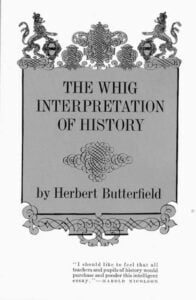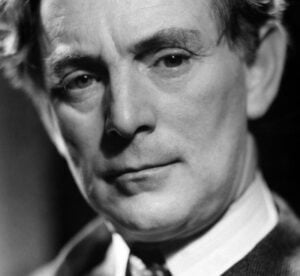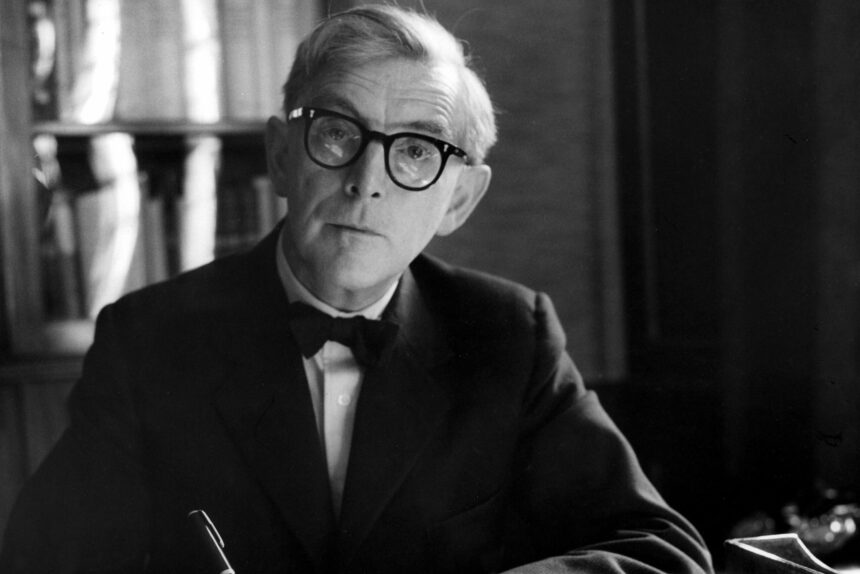The Skeptical Liberal

Herbert Butterfield is best known as a historian and historiographer, and he published one of the most, if not the most, influential works of historiography in the 20th century, The Whig Interpretation of History (1931). Butterfield was also an extraordinarily versatile scholar who was one of the two primary founders, along with Martin Wight, of the English School of international relations, which historicized many of the traditional principles of international realism.
One of Butterfield’s primary contributions was his attention to the particularities of international systems. He claimed that, while these systems generally manifested the importance of the lack of any single legitimate international authority, they also displayed varying degrees of anarchy, which undermined dogmatic claims about the uniformity of international systems.
This article, however, will focus on a neglected aspect of Butterfield’s work: his essays on politics and tradition. Butterfield’s political thought combined his Augustinian skepticism about the possibilities of human perfectibility with a conception of society as a fragile but natural construction, one susceptible to decay and fragmentation if the interconnections between the moral life and the political life are not intimately understood. Butterfield maintained a consistent and coherent view of both the human condition and the place and character of politics in the world of human activity.
Butterfield’s political thought is directly connected to his Augustinian Christianity, but it is also informed by his commitment to the moderate individualism that he associated with the Whig tradition of British politics. Thus, Butterfield’s political thought can be understood not only in terms of its intrinsic value but also in terms of its contribution to a wider tradition, which I will refer to as skeptical liberalism.
Herbert Butterfield’s version of skeptical liberalism owes more to his religious and practical beliefs than to his epistemological commitments, though his political thought is also characterized by the kind of practical epistemological skepticism that informs the work of thinkers like Hans-Georg Gadamer and Michael Oakeshott. Like other skeptical liberals, Butterfield’s skepticism is not primarily metaphysical but practical, and could be described as a particular type of conservatism, as long as it is understood that this type of conservatism has nothing to do with metaphysical assertions about natural law or natural rights. Thus, Butterfield’s brand of conservatism cannot easily be made to fit into the mold of American libertarianism or neoconservatism. Indeed, he insists that there are limits to what politics can achieve, both because of the inherent cupidity of human beings and because of their epistemological limitations, while he also defends a polity that allows for a maximum of liberty within which individuals are free to pursue their own goals.
Almost everything that Butterfield asserts about politics is derived from his understanding of the character of human nature. Indeed, writing in History and Human Relations (1952), he claimed that it is necessary “to submerge the question of what a man does in the profounder question of what a man is.” Butterfield’s answer to that question is the same as that given by St. Augustine: Human beings are intrinsically unique and ultimately invaluable, but they are also inherently flawed. “Nothing could be more exact perhaps for any man than the statement that ‘all men are sinners and I the chief of them,’” he wrote in Christianity and History (1950). Thus, the human condition is indelibly marked by its imperfection and its imperfectability. Any reasonable conception of politics must therefore take into account what Kant called the crookedness of human nature.
For Butterfield, human selfishness “sets every compass slightly wrong; it puts the bend into our wishful thinking; and it gives a bias to our very righteousness.” In fact, the central error of modern political philosophy is its mistakenly sanguine conception of the nature of human possibilities. As Butterfield notes, “One of the greatest deficiencies of our time is the failure of the imagination or the intellect to bring home to itself the portentous character of human sin.” This neglect has led not only to the tragic dystopian experiments in collectivization in the old Soviet Bloc and Maoist China, but also to the perversion of the Western liberal tradition by undermining the moral practices on which the tradition is based. Indeed, one might say that, with the omnipresent success of the transgender movement, we have reached the reductio ad absurdum of the belief in the malleability of human nature and the rejection of human limitations.

Philippe de Champaigne c. 1650
(Los Angeles County Museum of Art)
For Butterfield, the political implications of sinful human nature are comprehensive. Like St. Augustine, Butterfield claims that governments exist primarily to maintain order, so that human cupidity is not tempted more severely to drastic, selfish, and violent action. He asserts that “social institutions, however bad, are better than nothing and have the effect of making men appear a little more virtuous than they really are,” and “though government does not cure men of sinfulness … evil is mitigated by institutions that are the gift of God.” Government is a gift from God that is meant to alleviate the effects of human moral weakness, and the first priority of government is, as it has always been, to maintain the public peace. Governments which accomplish this successfully are, by definition, good governments, or, at least, they meet the minimal standards of government competence.
Thus governments, like many of those currently in power in the West, that refuse to enforce the law (whether this is the criminal law, laws protecting property, laws against harassing members of the judiciary, or laws protecting the territorial integrity of a state) are failed states. Further, because the primary responsibility of government is to enforce order, there is no single institutional form that is universally good for all political communities everywhere and every-when. Indeed, as Butterfield observes, “no man has yet invented a form of political machinery which the ingenuity of the devil would not find a way of exploiting for evil ends.” Thus, focusing on human sin often leads Butterfield to advocate a purely prophylactic role for the state. Any conservatism worth the name would arrive at a similar conclusion.
Nonetheless, Butterfield acknowledges that Western liberal democracies have done an admirable job at creating institutions that effectively order human selfishness into acceptable paths. However, these liberal states have accomplished this as much through the development of social institutions as through governmental coercion. Butterfield notes that “the orderings and arrangements of a healthy society seem to help out man’s imperfections, conspiring with quiet inducements and concealed checks to keep the surface of life comparatively respectable.”
Thus certain institutional arrangements are capable not only of maintaining order but also of channeling human selfishness into productive enterprises. Butterfield writes:
men have cupidities and … they are engrossed in the task of pushing their private business on. But they are agents of deeper processes than those of which they are aware, instruments of a Providence that combines their labors and works them into a larger pattern.
Butterfield’s reference to Providence suggests that there is a divine element to all social cooperation, but it also points to the capacity that human beings have to create meaning for themselves, despite their limitations. Providence not only refers to a divine action but also to the human interpretation of that divine action.
Though Butterfield recognizes the significance of this human achievement, he is worried that its fragility is being forgotten. In his essay, “Human Nature in History,” Butterfield writes:
If you were to remove certain subtle safeguards in society many men who had been respectable all their lives would be transformed by the discovery of the things which it was now possible to do with impunity.
It is precisely the social institutions of civilized life that condition and restrain human cupidity, and, if these were loosened or discarded because of, for example, some neo-Pelagian argument about innate human goodness, civilization, as we know it, would soon cease to exist.
An objective analysis of the current moral state of the United States would confirm Butterfield’s general argument about the connection between the removal of “subtle safeguards” and moral collapse. It is certainly the case that the relaxation of American mores over the past 50 years has created the space in which the polymorphous perversity that now characterizes American moral life can flourish. Thus, for Butterfield, the difference between civilization and barbarism has nothing to do with the innate character of human beings, which is uniform, but is dependent upon the existence of the particular sorts of social institutions that are appropriate to the human condition.
If Butterfield’s recognition of and emphasis on the centrality of human sin represent the skeptical or conservative side of his Augustinian politics, then his conception of and insistence on the unique and intrinsic worth of each human being characterizes its positive or liberal side. Butterfield claims that the Christian doctrine of the soul entails a high degree of respect for individual personality. He writes that “actual live human beings are to be taken as the values in the world because they are souls meant for eternity.”
It is, of course, the spiritual character of human persons that makes them so important. Each individual, as the creation of a loving God, is endowed with an eternal soul and cannot be reduced to a set of material interests, racial or ethnic traits, or gender characteristics.
Butterfield’s Christianity informs his Kantian formulation of the place of the individual in society. He asserts that
each individual soul is of eternal moment and has a value incommensurate with the value of anything else in the created universe…; human souls are…the purpose and end of the whole story, so far as the world is concerned—not merely the servants of the species and not ever mere means to some other mundane end.
Thus, though humans are inherently limited by their own sinfulness, the political and social institutions they build ought to enhance their own individual lives and are not to be taken as ends in themselves. Collectivities of any sort, whether they are professional, political, ethnic, or religious, are subordinate to the individuals who compose them. As Butterfield writes:
The systems break, the organizations crumble, though man himself goes on; and for this amongst other reasons we must never regard these systems and organizations as being the actual end of life, the ultimate purpose of history.
Political and social institutions are thus instrumental for human beings, both because such institutions mitigate the consequences of human sin and because certain kinds of institutions enable human beings more fully to fulfill their capacities by being more suitable to human nature.
Along with his Augustinian Christianity, Butterfield’s political ideas are shaped by a practical reading of the modern European past generally and the last 300 years of English history in particular. Butterfield’s most extensive elaboration of the tradition of skeptical liberalism is found in the second essay of The Englishman and His History (1944) and in the second essay of Liberty in the Modern World (1952). The account he provides in these essays consists of the construction of a practical—or, in his terms, prophetic—reading of the past, which is meant specifically to inform current political practice.
Neither essay is a work of technical or academic history. Instead, each is best understood as an attempt to conceive of English politics as a unified tradition that embodies Butterfield’s own Augustinian philosophical and theological anthropology. This English tradition is skeptical in its rejection of revolutionary, ideological, or messianic versions of politics, and it is liberal in its commitment to an understanding of the state as a nonpurposive civil association.
It should go without saying that Butterfield’s version of the English political tradition does not include the experience of Britain over the last 25 years, which I’m sure he would find to be an exemplary case of the hubristic, false, and therefore misplaced confidence in the infinite perfectibility of human nature.
Butterfield makes three distinct arguments concerning the nature of liberty and its place in modern politics. First, he claims that liberty properly understood is closely related to the tradition of political practices in England since the 17th century.
Second, he argues that the English tradition of liberty is not ideological. In other words, it is not based upon an appeal to abstract or transcendental conclusions about natural rights or utility but is instead rooted both in the concrete practices of English political life and in the understanding that compromise and consensus are at the heart of that life.
Third, he maintains that liberty is best preserved by a government that provides the maximum amount of freedom to the individual, consistent with the maintenance of the fragile order that supports society.

(Intercollegiate Studies Institute)
Thus, Butterfield’s commitment to skeptical liberalism is informed by his reading of the traditions of ordered liberty embedded in the English way of life, and his reading of the appropriateness of the English tradition is intimately connected to his contention that the tradition reflects in a profound way an inherited Augustinian conception of human beings as intrinsically precious but imperfect.
Butterfield’s conclusions about the English tradition might usefully serve as a set of maxims for any meaningfully conservative contemporary politics:
- “There is much to be thankful for in the British constitution … and this must not be jeopardized in order to forestall purely hypothetical dangers or to hurry unduly the achievement of a remote, precarious or purely speculative good”;
- “Abuses are to be reformed … but their removal is to be postponed if it would involve a great tear in the social fabric, or if it would provoke vested interests to desperate measures”;
- “Beneficent legislation … might have to be suspended or delayed for a shorter or longer period, if its immediate achievement would divide the country too sharply and embitter political life at the next stage of the story; or if its enactment or its execution would entail too great an exercise of power.”
Butterfield’s political thought offers a needed corrective to the current theory and practice of politics in the Western world. He insists that civilized politics necessarily involves a respect for continuity if ordered liberty is to survive, an acceptance that compromise is an inherent part of political life, and an acknowledgment that consensus is almost always more important than immediate action. Such a perspective leads to a rejection of both Manichean self-righteousness and ideological rigidity in politics.

Leave a Reply